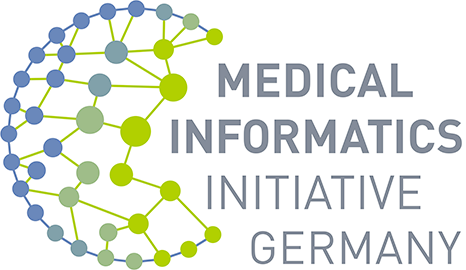Berlin, 27 June 2024: The Medical Informatics Initiative (MII), funded by the Federal Ministry of Education and Research (BMBF), has established structures and processes to make data from routine care accessible for medical research. The MII presents its results in a special issue of the Bundesgesundheitsblatt, which was published online in June 2024. The authors explain how the decentralised, federated infrastructure of the MII works.
As part of the MII, data integration centres ( DIC) have been established at all university medical sites and the first non-university hospitals to extract and process healthcare data from the primary IT systems and make it available for medical research in accordance with data protection regulations. For the first time, researchers can use the German Portal for Medical Reserach Data (FDPG) to query and apply for the available datasets from the healthcare documentation of all German university hospitals via a centralised access point.
Head of the MII Coordination Office Sebastian C. Semler, Managing Director of TMF e.V. says: "The MII decade project is the first funding programme to be created by the BMBF that connects all university medical sites in Germany-wide cooperation in order to create a unique, comprehensive research space for the use of health data. With its infrastructure, the MII is successfully laying the foundations for data-based medicine in Germany. At the same time, it is doing important groundwork for Germany's connection to the secondary use of health data in the European Health Data Space (EHDS). In order to successfully meet the requirements of a digital health and research landscape, it is necessary to develop a common health data architecture and a vision for data usage. The DIC and the FDPG in particular can take on important tasks in the health data architecture for the EHDS."
Other important preconditions of the MII for the nationwide use of data are the standardised contractual framework signed by all university hospitals, the MII core dataset in FHIR format and the broad consent for patient consent. To strengthen teaching in medical informatics, 51 new professorships, 21 junior research groups and various new degree programmes were established.
In order to create synergies, the MII has collaborated with other initiatives such as the "Nationale Forschungsdateninfrastruktur" (NFDI) and the Network of University Medicine (NUM), as well as with international initiatives such as the FAIR Data Initiative of the Research Data Alliance and the Observational Health Data Sciences and Informatics Initiative (OHDSI). The DIC have been integrated into the NUM funding programme so that they can continue to operate as a sustainable infrastructure. The MII and NUM have jointly established a coordination group for health research data infrastructures, which serves as a platform for the exchange of information between all relevant players in research and healthcare.
One of the challenges Semler sees on the way to the EHDS is creating acceptance among citizens and physicians who collect the data. This calls for a lot of information work and communication. He believes that good examples should be developed and communicated that show how data usage has contributed to better care.
To the publication:
https://link.springer.com/journal/103/volumes-and-issues/67-6
The Bundesgesundheitsblatt - Gesundheitsforschung - Gesundheitsschutz is a monthly health science journal whose editorial office is based at the Robert Koch Institute (RKI). The editors are the Federal Institute for Drugs and Medical Devices (BfArM), the Paul Ehrlich Institute (PEI), the Federal Centre for Health Education (BZgA) and the RKI. The journal covers all issues and areas of public health and public health policy.
Press contact:
Sophie Haderer
Phone: +49 30 22 00 24 7-32
Mobile: +49 173 4054214
Email: presse@medizininformatik-initiative.de
Background information on the MII:
The aim of the MII is to digitally network routine data from patient care throughout Germany and make it available for medical research in order to treat diseases faster and more effectively in the future. All of Germany's university medical centres are working on this together with non-university hospitals, research institutions, companies, health insurance companies and patient representatives in the four consortia DIFUTURE, HiGHmed, MIRACUM and SMITH. The Federal Ministry of Education and Research (BMBF) is funding the MII with a total of over 480 million euros up to and including 2026. Data protection and data security are top priorities.
The MII has been building data infrastructures at university hospitals since 2018. The MII partners have already demonstrated the benefits of their IT solutions in practice using a wide range of use cases - from intensive care to oncology. The focus of the consolidation and extension phase (2023-2026) is on extended collaboration between the university hospitals and their cooperation with new partners, particularly from regional healthcare.
An important component of this infrastructure is the German Portal for Medical Research Data (FDGP). It is intended to serve not only MII partners, but also all researchers as a central point of contact if they want to use data and biosamples from university medicine. The FDPG is also aimed at the general public. It makes transparent which projects are conducting research with patient data and what results have emerged.
In addition, the BMBF is funding six "Digital Hubs: Advances in Research and Health Care” (2021-2025) as part of the MII. Their task (initially in pilot projects) is to integrate the pioneering work of the university hospitals into other areas of the healthcare system: from outpatient care in practices to rehabilitation and aftercare. To strengthen research and teaching in the field of digital health, the BMBF is also supporting newly established professorships with a total of 21 junior research groups (2020-2026).
A coordination office is responsible for the national coordination of developments within the MII, which is operated by the TMF (Technology, Methods and Infrastructure for Networked Medical Research) together with the MFT (German Association of Medical Faculties) and VUD (German Association of Academic Medical Centres) in Berlin.


